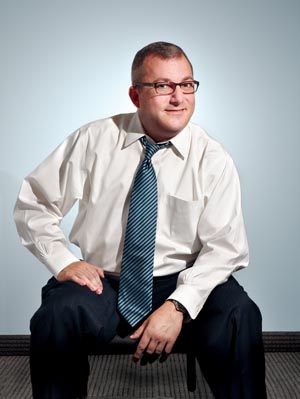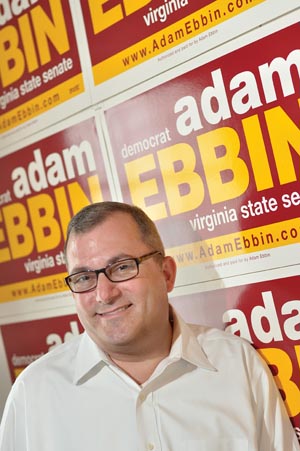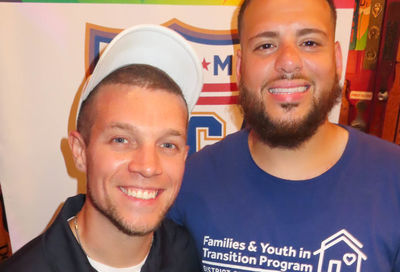All or Nothing
Virginia's only out gay legislator, Adam Ebbin, risks his spot in the House for a shot at the Senate
It would be overly dramatic to say that Adam Ebbin is in the race of his life. Still, Aug. 23 will be a defining moment not only in his career, but for the Virginia General Assembly.
Elected to represent Virginia’s House District 49 – comprised of parts of Alexandria, Falls Church and Arlington and Fairfax counties – in 2003, taking his seat in January 2004, Ebbin has served as the commonwealth’s sole openly LGBT member of the Virginia General Assembly.

Adam Ebbin
(Photo by Todd Franson)
Now, he’s risking his incumbent status in the House to make a run for the state Senate. And he has competition. Senate District 30, spread along the Potomac from Arlington south to Fort Belvoir, is solidly Democratic. In D.C. fashion, that makes the Aug. 23 Democratic primary Ebbin’s de facto Election Day, even if the Democratic winner will face Republican Tim McGhee Nov. 8. And with Jasper Hendricks of Farmville, Va., who has served as director of field operations and political programs for the National Black Justice Coalition, pulling out of his House race, Ebbin is running an all or nothing race – not just for himself, but for the LGBT community.
In a state such as Virginia, relatively dignified on the surface, but home to one of the country’s most anti-gay laws, prohibiting any recognition of same-sex relationships, losing the sole out gay legislator could be considered a serious setback.
As Dave Albo, a moderate Republican who serves with Ebbin in the House and represents neighboring Northern Virginia District 42, puts it in an email to Metro Weekly:
”Adam has had an interesting career in the General Assembly since he was the first openly gay member of the House. While that’s not all he is about, that is the issue he was most vocal about. And the interesting thing is that many of the members of the House, especially the older members, had never knowingly met a gay person. They probably had preconceived notions about what a gay person would be like, only to find out that he is just a great guy, very nice and friendly.”
With politicians such as anti-gay Virginia Attorney General Ken Cuccinelli also in the Richmond mix, Ebbin has the onerous duty of representing not only his constituents, but all LGBT Virginians. Because without him, in that special legislators’ context, they would effectively disappear once again.
METRO WEEKLY: Why run for the Senate? Is it worth the gamble?
ADAM EBBIN: It’s either up or out. Next January, I’ll either be serving in the Senate, or not serving.
I think the opportunity of serving in the Senate, most likely in the majority, will allow me to serve even more effectively than the service that I’ve already given. It’s a rare opportunity, and I think I’m up for it. My experience in the House will allow me to be a much, much better senator than the alternatives.
MW: Would you say you’re a risk-taker, or a cautious politician?
EBBIN: I’m generally a risk-taker, especially if I see something that is worthwhile.
MW: Tell me about your Democratic competitors for the Aug. 23 primary, Libby Garvey, a member of the Arlington Public Schools Board, and Alexandria City Councilman Rob Krupicka.
EBBIN: I’ve known them both for years. They’re good Democrats. They both serve in bodies with like-minded individuals where they are able to get the support of people who think like they do to do good things.
The contrast is that I’ve had eight years being effective at the state level, standing up to Ken Cuccinelli Republicans, at the same time passing bipartisan, progressive legislation that benefits the communities that I represent.
MW: There’s a lot of money going into this race, isn’t there?
EBBIN: There is. It’s a rare race for a seat that will likely stay Democratic for years and years to come. And elections cost so much more money than they should.
I’ve raised a lot more in this race, partly because the last few re-elections I’ve been involved with have not been contentious races.
MW: Does that make this race more stressful than your prior campaigns?
EBBIN: It’s invigorating and energizing. Sure there’s some stress, but I enjoy meeting the voters. I enjoy getting the reactions at the doors.
MW: Your campaign materials list some of your political achievements – working for the environment, for domestic partners, and on – but in your own words, what are you most proud of from your years in the House?
EBBIN: Results for workers who are being abused – in terms of not being paid, having paychecks bounce intentionally – and expanding protections for seniors through the Adult Protective Services Act.
I guess what most satisfies me is being a voice for people who don’t have a strong voice in Richmond and bringing results for them, whether it’s gay people, immigrants, seniors or working-class people.
MW: Do you get much feedback from these constituencies particularly?
EBBIN: People have been very appreciative of the work, and it’s rewarding. I received some awards. Equality Virginia gave me Outstanding Virginian. And senior citizens were very grateful when we expanded the Adult Protective Services Act.
The labor unions have recognized my work with an award this year. I stand up for unions. It’s exciting to me when I go and speak to the laborers, the local chapter of the laborers. It empowers me. For me, politics is about empowering people who don’t have positions of privilege. I get invigorated by that work. It’s rewarding to me, having that pay off, just doing the work.
MW: Does this sort of advocacy ever go beyond Virginia? Are you involved with these constituencies, these issues, beyond the commonwealth?
EBBIN: There are always groups dealing with immigration who ask for endorsements of different legislation. With seniors, not as much. I’m a member of the National Caucus of Environmental Legislators. There are different national groups who are always eager for participation.
MW: Your upbringing seems pretty standard all-American, but did you have some kind of outsider status growing up that helps you relate to these constituencies you see as somewhat under-represented? Was it being a gay kid in the closet?
EBBIN: I think that’s a lot of it. I wasn’t out when I was in college or high school. But if you’re in a minority, or if you have been oppressed, not just empowering people but watching history wake up is exciting. It’s particularly exciting when you feel that you’ve been left behind.
MW: What sort of kid were you in high school?
EBBIN: I was the president of the Student Council. I was the president of the sophomore class. I was a patrol leader in Boy Scouts.
MW: What about during college at American University?
EBBIN: I was on the Student Confederation, but not the same level as leadership positions.
MW: There’s a story from your youth, you being a Gerald Ford supporter in the 1976 presidential race. Why not Carter?
EBBIN: [Laughs.] In New York, there used to be moderate Republicans. I didn’t know any better. But I thought Gerald Ford was a great president. I liked what he did. And now we learn that he was the first former president to endorse gay marriage. I think my instincts were good in that case. [Laughs.]
MW: Speaking about youth, as well as the groups you stand up for, tell me about the bullying legislation you introduced. Has that been tabled?
EBBIN: It was referred to a study, which is better than being tabled. Hopefully, in the next legislative session, there will be a report about the prospects of it passing and what bullying legislation is needed in general, and the extent of the problem. And that will build support ultimately for passing more comprehensive anti-bullying legislation.
MW: What prompted you to introduce it?
EBBIN: There was a 15-year-old boy named Christian Taylor in York County, Va. He killed himself after being severely bullied. It troubled me, as the whole spate of national bullying suicides were brought to the spotlight.
I spoke to his mother about what happened before he died. I don’t know that this bill would’ve saved his life, but I don’t want any cases of bullying that we can stop to go on. She was very happy that there was an effort to address similar circumstances and end them.
MW: Tell me bout the process with this particular bill.
EBBIN: Any bill that you bring before the Courts Committee is analyzed, dissected — devil’s advocate is played. There are questions as to whether or not you need the bill.
People were sympathetic to the problem, but whether or not they agreed with the solution is debatable.
MW: You didn’t get any homophobic blowback?
EBBIN: No. In fact, one of the more conservative members of the Courts Committee came up to me to express personal concern about the problem.
MW: Was that a surprise?
EBBIN: It wasn’t. As I’ve gotten to know people in Richmond, you realize they’re not always what they seem. Unfortunately, there are a lot who are what they seem. [Laughs.] But I think I’ve been able to build bridges.
MW: Have there been instances where you have faced outright homophobia in Richmond?
EBBIN: [Del.] Bob Marshall (R-Prince William) said on the floor last session that gay people were ”intrinsically disordered,” and I was able to stand up and call him on it.
Not that I’m impolite, but I’m not the typical ”Virginia gentleman.” I think it’s important when someone’s down there who is going to be a homophobe that someone who’s gay call him on it, challenge him, not let things like that go by.
MW: As a transplanted Virginian – from New York, then Maryland – tell me about your state.
EBBIN: Virginia is a beautiful state, but it’s very slow to change. Even the people are ahead of the government in many cases. That’s one of the other things that’s pretty satisfying about serving. I think I used the phrase before – it comes from a song – ”watching the world wake up from history,” and it’s slow-going. But after prodding, pushing and pulling, it’s exciting to see Virginia start to wake up to some issues that are really important.
MW: Compared to when you arrived in 2004, it almost seems that Virginia may be going backward to some degree. Cuccinelli is hostile to LGBT issues, for example. Is there a tea party bloc in Richmond?
EBBIN: A lot of my Republican colleagues are more afraid of the tea party than belong to the tea party. They’re afraid of being ”primaried” by the tea party. And that encourages them to vote more conservatively, not to stick their necks out, that sort of thing.
MW: If the tea party takes a hit, would that make your job easier?
EBBIN: Anything that makes the General Assembly more moderate makes it easier for me to do my work successfully.
Sometimes it’s one step back and two steps forward. I’m awaiting the two steps forward – and working for them. The pendulum in Virginia has been, for many, many years, that after the president is elected, we’ve never had a governor of the same party as the president. So there’s a real back and forth.
MW: You said a few years ago that there were House members with whom you wouldn’t want to get into an elevator. Has that changed?
EBBIN: Yeah. The relationships have improved to the point where I’m willing to get in the elevator with anyone. [Laughs.]
MW: What about Cuccinelli? Have you had much face time with him?
EBBIN: No. I shook his hand once after he was sworn in. I called his office last summer and asked for his support for some bills dealing with human trafficking that I was building a coalition on. His office called back and said he was only interested in things dealing with what’s constitutional or not. That’s very different than the way Gov. Bob McDonnell was when he was attorney general.

Adam Ebbin
(Photo by Todd Franson)
I chaired a commission on the prevention of human trafficking and I had Cuccinelli as my vice-chair, which was largely symbolic. But he just wasn’t interested. The governor, though, was interested and endorsed the concept of our legislation. And Gov. McDonnell did send a representative to my commission when he was attorney general.
MW: Human trafficking is a bipartisan issue.
EBBIN: It certainly is.
MW: Did you take Cuccinelli’s response as a slight?
EBBIN: I didn’t know what to make of it. He certainly spends his time suing the federal government and going on inquisitions that are not dealing with state legislation. I’m a little bit gullible at times, so I might’ve believed the explanation. [Laughs.] But I really don’t know what to make of it.
MW: From an LGBT perspective, Cuccinelli is the obvious villain in Virginia politics. You can’t offer any, ”Oh, but he’s a really personable guy in person”?
EBBIN: No. A theme of my campaign is that we have to stand up to Ken Cuccinelli and we have to do all we can to stop him. I had a bill in to limit his civil authority. I put in a floor amendment to counteract his opinion that colleges and universities couldn’t enact nondiscrimination policies to include gay and lesbian people. I’ve spoken at rallies and a news conference. And one of the commitments I make to voters as a I go door to door is that I’ll continue to shine a light on his bad practices during what I hope will be his last two years in office.
MW: Is Cuccinelli someone your constituents worry about?
EBBIN: When I go door to door and I mention my work against Cuccinelli, people agree. They’re generally supportive of the variety of issues I’ve been involved in. I have a pretty progressive record. When I co-sponsored a bill to provide insurance for children with autism, there were a large number of constituents who contacted me about that. I hear a lot from gay and lesbian people when there are bills dealing with sexual orientation. I hear a lot from people about homelessness. It really runs the gamut.
MW: Whether we’re talking about House District 49 or Senate District 30, this is possibly the gay-friendliest part of Virginia?
EBBIN: Yes. It’s among the most Democratic territory in Virginia. There are wonderful neighborhoods, welcoming people and a progressive mindset. People are very welcoming to gay and lesbian neighbors, and to diversity of all kinds. There’s also kind of a hometown feel in my district. We’ve got a wonderful July 4 parade in a neighborhood called Douglas Park; a Halloween parade in Del Ray. It’s just a wonderful place with lots of wonderful places within.
MW: When did you move from Maryland to Virginia?
EBBIN: 1989.
MW: How has your district changed since then?
EBBIN: It’s an increasingly cosmopolitan area. Mount Vernon Avenue in Del Ray used to be a rundown street. Now it’s a very desirable neighborhood to live in. Everyone wants to walk to the avenue. Arlington has gotten even better than it was.
I have a lot of working-class folks, but their circumstances in many cases have improved, too. The price of housing, though, is a concern. It’s expensive for working-class people to live here. There’s ”workforce housing” in Potomac Yard. Arlington has been pretty good with trying to establish more affordable housing. But they can’t do it at a fast-enough pace. A number of us in Richmond have supported an affordable-housing trust fund, but that hasn’t come to fruition yet.
MW: I noticed you were at Servicemembers Legal Defense Network for a brief stint. What sort of work do you do outside of the General Assembly?
EBBIN: You can’t really be in a full-time job during the General Assembly. I did spend some time as a consultant for a group called the Center for Policy Alternatives, which was a progressive organization dedicated to fostering bipartisan relationships between state legislators around the country, active on a lot of progressive issues. I ran their marriage-equality leadership circle for several years. But when the economy went south, funding for foundations did dry up and the organization is now defunct.
MW: An organization that is alive and well is the Gay & Lesbian Victory Fund. What’s your relationship with that organization?
EBBIN: I wouldn’t have been elected in 2003 without the Victory Fund. As a new candidate, they were just critical. This year, they’ve endorsed me again and made a significant financial contribution.
I did go through the Victory Fund candidate training, which was critical as well. I took it after running [Arlington County Board Member] Jay [Fisette]’s campaign, and before running a City Council campaign in Alexandria. They just really helped me focus on what matters for a candidate, rather than get diverted. There are a lot of political trainings, but I just thought it was the best. They help you realize what’s important to a successful campaign. It sounds elementary, but meeting voters, how to raise money, how to deal with being a gay candidate.
MW: What’s your relationship with the Virginia Progress Fund? Writing about gay money in politics, Time mentioned the fund under a seemingly sensational 2008 headline dubbing it part of ”gay mafia.”
EBBIN: The Virginia Progress Fund was a political action committee I set up in 2005. And with the help of some generous donors from Virginia and outside Virginia, we were able to take out a state legislator who had introduced the anti-gay adoption law, which was really fulfilling. His name was [Del.] Dick Black (R-Sterling). He was known mostly for giving out little plastic fetuses to other legislators. A Republican legislator had come up to me and said, ”Can’t you guys beat Dick Black and Bob Marshall?” That legislator, on election night, I called and I said, ”Well, we got one.”
MW: What happened to the fund?
EBBIN: I closed it out. It was active in the last election cycle. It was really active in 2005.
MW: Who picks up those reins?
EBBIN: Equality Virginia has a PAC. Virginia Partisans is active around the state. There were some folks nationally who were really eager to help me defeat some people and help me elect better people. And we were able to do that. But a lot of national donors have moved on to states where there are marriage battles, rather than where there are state legislative battles.
MW: That brings to mind Maryland. Any idea why these two states are so different?
EBBIN: I don’t know if I could be a good analyst on that, but in Maryland there’s a lot more population near D.C. and around urban Baltimore. In Virginia, there has been a large rural population, which has changed or is changing.
Our No. 1 export now is microchips. It used to be tobacco. Tobacco is still a big part of Virginia’s economy, but we’re changing. We still have a lot of coal being mined in southwest Virginia, and I’d like to see alternative energy, green jobs, come to Virginia.
I passed a bill to establish a low-interest loan fund for consumers to buy solar panels. I worked with the chairman of the Commerce and Labor Committee, who is from coal country in southwest Virginia. Maybe it’s from my relationship with him. And I think that’s one of the things that will allow me to continue to be a success and more successful as a senator: People know me on both sides of the aisle. Not just across the aisle, but across the commonwealth, and we’ve worked together.
MW: Continuing with relationships, I know nothing of your personal life. It can’t be politics all the time.
EBBIN: Sure. But not during this election year! [Laughs.] I don’t have any pets, and I’m single. I’ve got a real fondness for travel. And for movies, which I haven’t seen for many, many months.
MW: But you live across the street from a huge theater.
EBBIN: I know, I know….
MW: As far as your relationship with the LGBT community, you are our only representation in Richmond. What happens if that representation ends?
EBBIN: I’m planning on winning. That’s what I’m working on. I haven’t given thought to not winning. That’s where I am.
And I need the gay community to be behind me. I need gay people to volunteer for me. I need gay people to step and contribute for me. I’m working to be there. If people feel strongly that it’s vital for me to be there, I need them to join me.
MW: What can you do as senator that you can’t as a delegate?
EBBIN: It’s easier to pass progressive legislation through the Senate. Then, when I bring that same legislation to the House, because of my good standing in the House, it won’t be like some freshman senator who’s practically hazed. I’m taken seriously in the House. If I bring in a bullying bill that’s passed the Senate, I believe that it will have a better chance of passing the House.
There’s more work to do. There’s much more to do for GLBT people. I’m tenacious and I’m not going to stop until we’ve achieved more success, achieved equality.
To learn about Adam Ebbin’s campaign for the Virginia Senate, call 703-739-4330 or visit adamebbin.com.
Support Metro Weekly’s Journalism
These are challenging times for news organizations. And yet it’s crucial we stay active and provide vital resources and information to both our local readers and the world. So won’t you please take a moment and consider supporting Metro Weekly with a membership? For as little as $5 a month, you can help ensure Metro Weekly magazine and MetroWeekly.com remain free, viable resources as we provide the best, most diverse, culturally-resonant LGBTQ coverage in both the D.C. region and around the world. Memberships come with exclusive perks and discounts, your own personal digital delivery of each week’s magazine (and an archive), access to our Member's Lounge when it launches this fall, and exclusive members-only items like Metro Weekly Membership Mugs and Tote Bags! Check out all our membership levels here and please join us today!




















